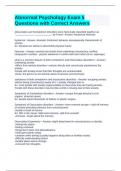-
1. Tentamen (uitwerkingen) - Abnormal psych exam #1 review questions with latest update
-
2. Tentamen (uitwerkingen) - Abnormal psych exam 1 (ch 1-6) questions with correct answers
-
3. Tentamen (uitwerkingen) - Abnormal psych exam 1 fsu questions and answers
-
4. Tentamen (uitwerkingen) - Abnormal psych exam 1 wustl questions with correct answers
-
5. Tentamen (uitwerkingen) - Abnormal psych exam 1, abnormal psychology test 1 questions and answers
-
6. Tentamen (uitwerkingen) - Abnormal psych exam 3 - ch. 8, 9, 10, 11 questions with latest update
-
7. Tentamen (uitwerkingen) - Abnormal psych exam questions with correct answers
-
8. Tentamen (uitwerkingen) - Abnormal psych. exam 1 ch. 1-3, 16 questions with verified answers
-
9. Tentamen (uitwerkingen) - Abnormal psychology - exam 3 questions with correct answers
-
10. Tentamen (uitwerkingen) - Abnormal psychology (exam #4) questions and answers
-
11. Tentamen (uitwerkingen) - Abnormal psychology 4610 - exam 1 questions and answers
-
12. Tentamen (uitwerkingen) - Abnormal psychology ch. 5-8 exam questions with latest update
-
13. Tentamen (uitwerkingen) - Abnormal psychology chapters 1-7 exam questions with latest update
-
14. Tentamen (uitwerkingen) - Abnormal psychology exam #1 questions and answers
-
15. Tentamen (uitwerkingen) - Abnormal psychology exam 1 (ch 1-3) questions with complete solutions
-
16. Tentamen (uitwerkingen) - Abnormal psychology exam 1 (chapters 1-5) questions with verified answers
-
17. Tentamen (uitwerkingen) - Abnormal psychology exam 1 (multiple choice) questions with correct answers
-
18. Tentamen (uitwerkingen) - Abnormal psychology exam 1 questions with latest update
-
19. Tentamen (uitwerkingen) - Abnormal psychology exam 2 (uark) questions and answers
-
20. Tentamen (uitwerkingen) - Abnormal psychology exam 2 multiple choice questions with correct answers
-
21. Tentamen (uitwerkingen) - Abnormal psychology exam 2 practice questions with correct answers
-
22. Tentamen (uitwerkingen) - Abnormal psychology exam 2 questions and answers
-
23. Tentamen (uitwerkingen) - Abnormal psychology exam 2 questions with verified answers
-
24. Tentamen (uitwerkingen) - Abnormal psychology exam 3 questions with latest update
-
25. Tentamen (uitwerkingen) - Abnormal psychology exam 5 questions with correct answers
-
26. Tentamen (uitwerkingen) - Abnormal psychology: exam dsm-5 disorders questions and answers
-
27. Tentamen (uitwerkingen) - Abnormal psychology exam questions and answers
-
28. Tentamen (uitwerkingen) - Abnormal psychology exam questions with verified answers
-
29. Tentamen (uitwerkingen) - Abnormal psychology overview & history - exam 1 questions and answers
-
30. Tentamen (uitwerkingen) - Abnormal psychology test 1 exam questions with latest update
-
31. Tentamen (uitwerkingen) - Abnormal psychology test 1 study guide questions and answers
-
32. Tentamen (uitwerkingen) - Abnormal psychology test 1 study guide questions and answers
-
33. Tentamen (uitwerkingen) - Abnormal psychology test bank exam questions and answers
-
34. Tentamen (uitwerkingen) - Abnormal psychology unit 1 exam questions with correct answers
-
35. Tentamen (uitwerkingen) - Abnormal psychology unit 3 test exam questions and answers
-
36. Tentamen (uitwerkingen) - Abnormal psychology vocabulary exam questions with correct answers
-
37. Tentamen (uitwerkingen) - Abnormal psychology, exam revision (quiz) questions and answers
-
38. Tentamen (uitwerkingen) - Essentials of abnormal psychology exam 1 questions with latest update
-
39. Tentamen (uitwerkingen) - Exam 1, chapters 1-4, advanced abnormal psychology questions and answers
-
40. Tentamen (uitwerkingen) - P324 abnormal psych exam 1 questions and answers
-
41. Tentamen (uitwerkingen) - Ps280 abnormal psychology final exam questions with correct answers
-
42. Tentamen (uitwerkingen) - Psy 320-abnormal psychology exam 1 questions and answers
-
43. Tentamen (uitwerkingen) - Psy 341 abnormal psychology exam 1 questions and answers
-
44. Tentamen (uitwerkingen) - Psy30010 abnormal psych - exam revision questions and answers
-
Meer zien





